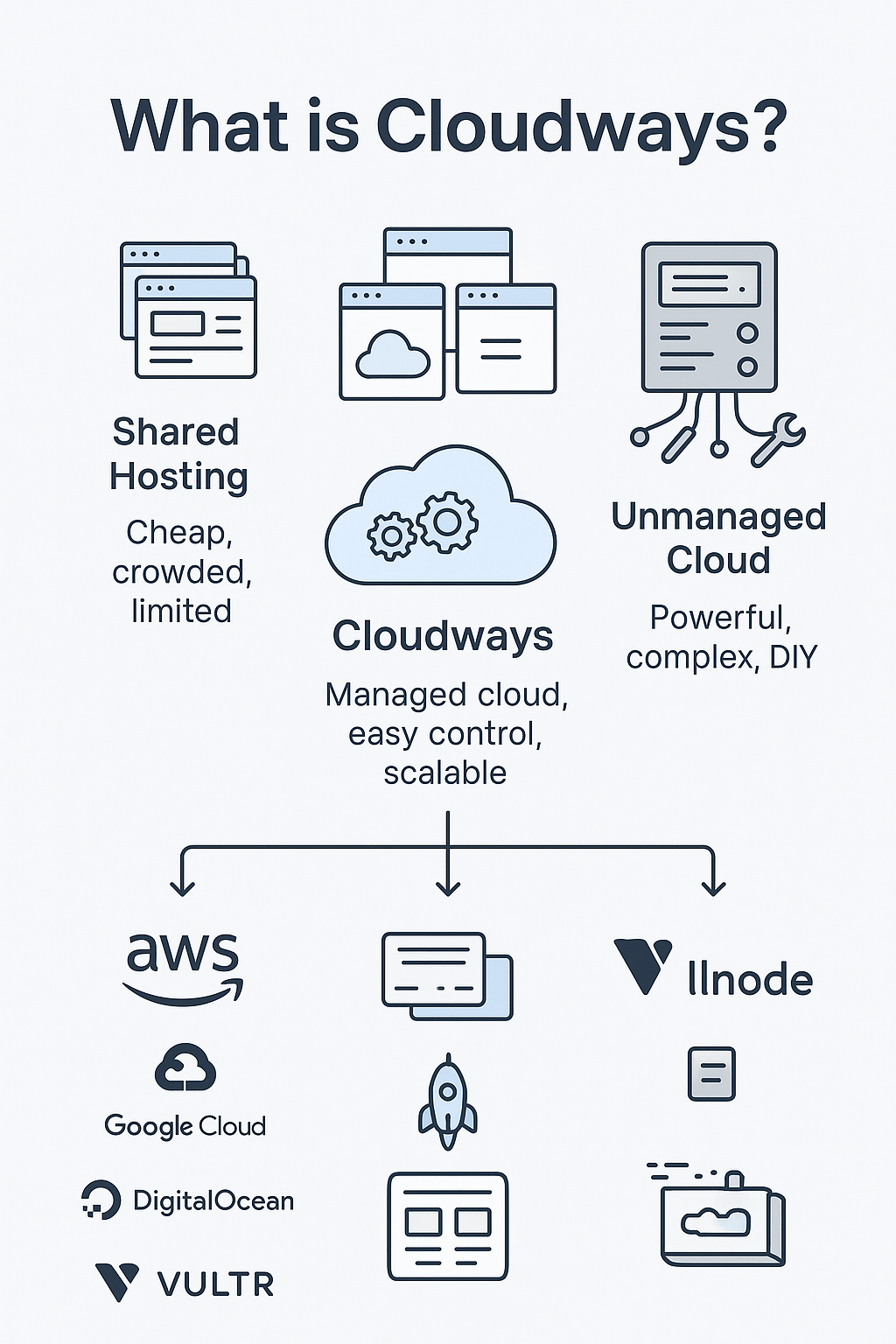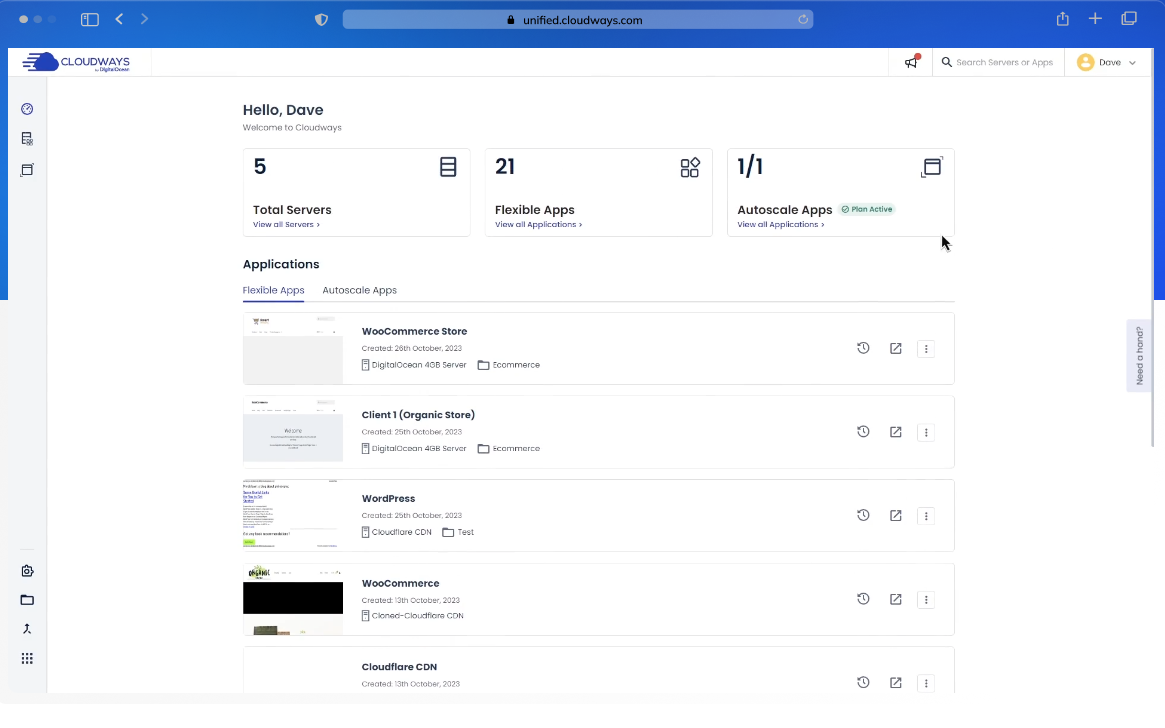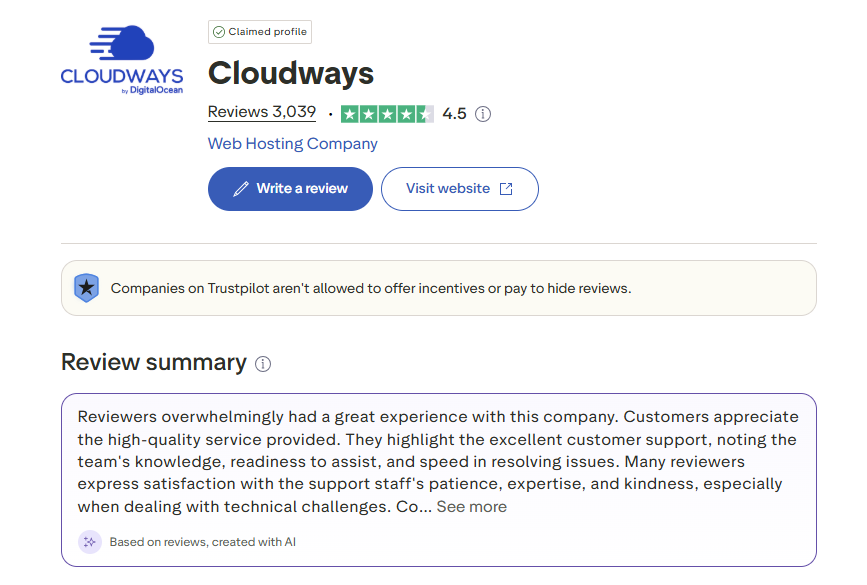Is Cloudways Worth It? An Honest Review for 2025
Finding a web host these days is a headache. Every company promises speed, uptime, and easy scaling, yet the reality often differs.
So, is Cloudways good in 2025?
Yes, Cloudways is good in 2025. It’s a managed cloud hosting platform that runs on top providers like AWS, DigitalOcean, and Google Cloud, handling server setup, security, and maintenance for you. It offers fast performance, easy scalability, and low server stress, making it ideal for businesses, developers, agencies, and eCommerce sites.
Although it’s not too cheap, it’s not too expensive either, though. You can get it fairly cheap with a 30% off discount for 5 months + 15 Free Migration, which sticks around till September 15th.
Here, we’ll talk about how it performs, where it struggles, and who might benefit from it this year.
What is Cloudways and How Does It Work?

To understand Cloudways, it helps to break down what it is and what it isn’t.
- Cloudways is not a normal web host. It doesn’t own physical servers or data centers.
- Cloudways is a managed orchestration layer. It automates the setup and ongoing management of cloud servers rented from providers like AWS, Google Cloud, DigitalOcean, Vultr, and Linode.
When you sign up, you first choose a provider and a server size. Cloudways then:
- Provisions the server automatically (installing Apache/Nginx, PHP, MySQL, etc.).
- Configures optimizations like caching, SSL certificates, firewalls, and monitoring.
- Adds a control panel designed to simplify everyday tasks like scaling, backups, and staging.
This model is significant because it sits in between two extremes:
- Shared hosting → Cheap and beginner-friendly but limited, with poor resource allocation.
- Unmanaged VPS/Cloud → Powerful and scalable but requires expertise to set up and maintain.
Cloudways combines the two: you get dedicated cloud resources with the convenience of a managed service. So, there’s more control and less chaos, along with the flexibility to choose infrastructure without the steep costs of hiring a sysadmin.
What Is Cloudways Good For?
Cloudways isn’t a perfect hosting solution for everything – and that’s a good thing. Its strongest appeal lies in serving professionals, businesses, and technical users who need a blend of performance, scalability, and management efficiency. Let’s explore each group in more depth.
1. Is Cloudways Good For WordPress?
WordPress powers more than 40% of the web, but anyone who has run a serious WordPress site knows how fragile performance can become.
Poorly optimized shared hosting environments quickly buckle under plugins, heavy themes, or spikes in traffic.
Cloudways directly addresses these pain points:
- Caching stack built-in: No need to juggle multiple caching plugins; Varnish, Redis, and Memcached are preconfigured.
- Staging environments: Test a new plugin, theme, or custom code in a sandbox before going live.
- Version control: One-click upgrades to PHP and database engines keep your environment current without risk.
How This Compares Elsewhere: SiteGround is easier for beginners, but high-traffic WordPress sites often notice throttling. Kinsta and WP Engine are optimized too, but at a much higher monthly cost.
Cloudways helps with optimization and is affordable, so it’s a strong long-term option for serious publishers.
Speaking of affordable, if you’re interested, you can with try out this Cloudways 30% Off Promo.
2. Is Cloudways Worth It For Agencies?
Agencies face unique hosting challenges. Every client site has different needs, yet downtime, sluggish performance, or complex workflows cut directly into billable hours.
Cloudways is particularly well-suited for agencies because it provides:
- Multi-site management: All client projects hosted under one unified dashboard with separate resources.
- Cloning and staging: Duplicate a client site in seconds for redesigns or testing.
- Resource allocation: Scale specific client projects independently — no risk of one high-traffic site slowing others.
- White-label possibilities: Agencies can resell Cloudways hosting as a managed service, adding margin without added infrastructure.
Alternatives in This Space: Flywheel markets itself to agencies with a polished UI, but it lacks Cloudways’ provider flexibility. WP Engine supports agencies too, but cost-per-site quickly escalates.
Cloudways gives agencies a balance of control, scale, and predictable margins.
3. Will Cloudways Be Useful For Developers and Technical Teams?
Developers often struggle between two extremes: too much control (raw VPS hosting that demands constant server babysitting) or too little control (shared hosting that restricts customization).
Cloudways strikes the middle ground with:
- SSH and SFTP access: Direct logins for advanced configuration.
- Git deployment integration: Push updates from repositories into staging or production.
- API-driven management: Automate scaling, backups, and monitoring.
- Choice of provider stack: AWS for enterprise apps, DigitalOcean for lean MVPs, Vultr for global reach.
Where Others Fall Short: Raw cloud providers like AWS and DigitalOcean give full control but leave updates, patches, and security entirely on your shoulders.
Cloudways removes that burden, so developers can focus on coding and shipping features instead of firefighting infrastructure.
4. Is Cloudways Good For e-Commerce? (WooCommerce, Magento, Shopify Alternatives)
e-Commerce is unforgiving when it comes to performance. A delay of even 1–2 seconds on a checkout page can cause measurable revenue loss. For high-volume stores, uptime isn’t just a metric — it’s the difference between profit and failure.
Cloudways caters to e-commerce stores by:
- Concurrency support: Redis and Varnish keep checkout processes fast during flash sales.
- Auto-scaling: Upgrade resources instantly for campaign-based traffic.
- PCI compliance readiness: Easier to configure compliance on supported providers.
- Global CDNs: Cloudflare and others reduce latency for international customers.
Why Not Shopify Itself? Shopify offers convenience but locks merchants into its ecosystem and takes a cut via transaction fees. SiteGround’s WooCommerce plans suit smaller stores but buckle under scaling. Kinsta offers WooCommerce optimization, but Cloudways delivers more infrastructure flexibility at a lower entry cost.
5. Is Cloudways Good For SaaS Startups and Application Builders
Beyond websites, Cloudways also fits SaaS apps, internal tools, and educational platforms. Startups often need to launch quickly on a budget but scale fast when adoption spikes.
Cloudways enables:
- Rapid prototyping: Start small on $11 DigitalOcean or Vultr servers.
- Scalable growth: Seamlessly upgrade RAM and CPU as user numbers grow.
- Multi-app hosting: Run WordPress, Laravel, Node.js, and custom stacks on one platform.
- Monitoring tools: Built-in logging and performance analysis to prevent bottlenecks.
Versus Other Hosts: Going direct with AWS or Google Cloud gives scale but burdens startups with DevOps costs. Cloudways bridges this gap, letting small teams move fast without hiring sysadmins.
What Makes Cloudways So Good?
Each of these groups values time and stability more than bare-minimum pricing.
Agencies can’t afford client downtime. E-commerce stores lose money every second a checkout hangs. Developers can’t scale if they’re constantly patching servers.
Cloudways is built for these scenarios. You can give it a go and start hosting with a 30% discount!
Cloudways Pricing: Is It Really Worth It?
Now, let’s review the pricing for Cloudways a bit. You can get vastly different performance at different prices, since there are several providers.
Cloudways follows a pay-as-you-go model tied to your chosen provider.
- Entry level: DigitalOcean at $11/month, Vultr/Linode around $12.
- Mid-range: AWS or Google Cloud starting at ~$30.
- Add-ons: Backups, premium support, and email hosting (via Rackspace) cost extra.
This flexibility can be both a blessing and a curse.
- For agencies and developers: It’s cost-efficient. You can scale projects as needed without paying for bloated plans.
- For beginners: The add-ons may feel like nickel-and-diming compared to all-inclusive providers like SiteGround.
Cloudways isn’t priced to compete with cheap shared hosts. It’s priced for value over time. You save money indirectly by avoiding downtime, hiring sysadmins, or overpaying for unused resources.
Cloudways Performance: Speed, Uptime & Scalability

Performance is one of the best things about it; most tend to just go with the priciest options just because of how well it runs.
Cloudways Lightning beats the Hybrid Stack under load. It boosts uncached and write-heavy tasks by up to 85 percent, speeds up logins and publishing by 30 percent, and handles about 70 percent more LMS users and 45 percent more e-commerce users at high concurrency.
Take a look at this performance analysis by Koddr.io.
On top of everything, tools like Varnish, Redis, Memcached, SSD servers, and Cloudflare also help keep things snappy.
Uptime usually sits above 99.95%. Scaling resources like RAM or CPU happens without downtime. Going straight to a provider may cost less, but Cloudways is good at quietly managing the details.
Cloudways Pros and Cons
Pros
- Access to multiple cloud providers
- Managed setup with caching and staging included
- Flexible scaling with pay-as-you-go pricing
- Consistently fast and reliable
Cons
- Lacks built-in email hosting
- Premium support adds cost
- Dashboard can confuse newcomers
- More expensive than raw cloud hosting
Cloudways Support and Ease of Use
Cloudways provides 24/7 support via chat and tickets. Priority support packages add faster response times and advanced troubleshooting.
The support style is more technical compared to providers like Kinsta. That means if you’re looking for handholding, you may find it slower. But if you value knowledgeable staff who can dive into logs and server configs, Cloudways delivers.
The dashboard is proprietary (not cPanel or Plesk). So, it could end up being a learning curve if you’re not used to it.
Most users adapt, and they report smoother workflows: faster staging, simpler SSL setup, and easier scaling.
Cloudways vs Competitors; Is It Better Value?
Cloudways sits between fully managed and DIY options.
- SiteGround: Easier start, includes email, slower and less scalable
- Kinsta: Premium WordPress support, faster responses, higher cost
- DigitalOcean direct: Lower price, full control, more work required
- WP Engine: Polished interface, strong support, premium pricing
It’s a nice balance of control and convenience. You also get much more flexibility than Kinsta, without dealing with the raw server management.
Real User Reviews: What People Say About Cloudways

On Trustpilot and G2, Cloudways averages over 4.5 stars. That’s the highest you can realistically get with all the other companies trying to yell they’re the absolute best at everything.
Though not 5 stars, almost all users are a big fan of its speed, uptime, and value for agencies. Most complains usually involve missing email hosting, add-on costs, and a learning curve.
You can even come across mentions of it all over Reddit from experienced users, while beginners may take time to adjust.
Is Cloudways Worth It in 2025?
For many, Cloudways feels worth the effort. It gets the user performance, scalability, and flexibility without reaching enterprise-level costs. There are plenty of ways it benefits everyone:
- Small businesses/bloggers: Speed benefits usually outweigh the learning curve
- Agencies: Makes handling multiple client sites smoother
- E-commerce stores: Keeps sites reliable and checkouts fast
- Developers: Offers a balance of control and convenience
If your goal is the cheapest hosting or a familiar cPanel interface, you might look elsewhere. If you still want something at a good price, it won’t be a bad idea to get Cloudways either – you can get a subscription for 30% off for 5 months.
FAQs
What is Cloudways used for?
Cloudways is a managed cloud hosting platform. It lets you launch servers on providers like DigitalOcean, AWS, Google Cloud, Vultr, or Linode, while it takes care of setup, speed, and security. You get the benefits of cloud hosting without wrestling with server admin.
Is Cloudways good for WordPress?
Yes. Cloudways is built with WordPress in mind. It comes with caching layers (Varnish, Redis, Memcached), staging sites, and one-click SSL and backups. Compared to shared hosts like SiteGround it’s faster, and unlike Kinsta or WP Engine it isn’t locked to one cloud provider.
How much does Cloudways cost per month?
Entry-level plans start around $11–14/month on DigitalOcean, Vultr, or Linode. AWS and Google Cloud run higher, usually $30+. Billing is pay-as-you-go, so you pay only for what you use. Extras like email hosting and premium support are optional.
Is Cloudways better than Kinsta or SiteGround?
For agencies and developers, yes; more flexibility and usually better value. For beginners, SiteGround may be easier. For WordPress-only businesses with high budgets, Kinsta may offer more handholding.
Does Cloudways offer free trials?
Yes, a 3-day trial with no credit card required. That’s enough time to check speed, test the dashboard, and spin up apps before deciding.

